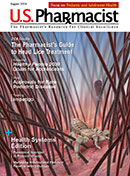Acne often continues into adulthood in women; however, few studies have specifically investigated the real-world experience of acne in adult populations. In a recent publication in JAMA Dermatology, researchers investigated the experiences of those with acne and its treatments among a cohort of adult women. The study was a qualitative analysis that was conducted from free-listing and open-ended, semi-structured interviews of patients from the University of Pennsylvania Health System and patients from Dermatologists of Southwest Ohio, which is a private practice.
The study involved 50 women aged 18 to 40 years of with moderate-to-severe acne who participated in interviews between August 30, 2019, and December 31, 2020. The primary outcomes and measures included free-listing data from interviews that were used to calculate the Smith S, a measure of saliency for each list item, and semi-structured interviews to identify themes about patient perspectives regarding their acne and its treatment.
The researchers found that 50 participants (average standard deviation [SD] age, 28 [5.38] years; 24 [48%] Caucasian) described acne-related concerns about their appearance that affected their social, professional, and personal lives, with many modifying their behavior because of their acne. The authors noted that depression, anxiety, and social isolation were frequently reported. Participants described successful treatment as having completely clear skin over time or a manageable number of blemishes.
Many participants expressed frustration with finding a dermatologist with whom they were comfortable and identifying effective treatments for their acne. Many respondents described feeling less confident at work due to their acne, as well as how their appearance affected both their personal and professional lives.
Many individuals also expressed interest in nonantibiotic acne treatments. In addition, while isotretinoin has been proven effective for many subjects, its adverse effects were a cause for concern. They concluded that women with acne have great concerns about appearance and experience mental and emotional health consequences and disruption of their personal and professional lives. They also indicated that many patients describe challenges finding effective treatments and accessing care, noting that future trials to understand the optimal treatment approaches for women with acne are warranted to enhance outcomes in this population.
Lead study author and investigator, John S. Barbieri, MD, MBA, of the Department of Dermatology at the University of Pennsylvania Perelman School of Medicine stated, "Nearly 50% of women experience acne in their 20s, and 35% experience acne in their 30s. While several qualitative studies have examined acne in adolescence, the lived experience of adult female acne has not been explored in detail. As a result, we conducted a series of semi-structured interviews among 50 adult women with acne to examine the lived experience of adult acne and its treatment."
Dr. Barbieri added that "Themes of depression, anxiety and social isolation were common. Some described feeling that their acne made them appear younger or less professional, trustworthy or qualified at work. Adult women with acne describe significant impacts on their lived experience, including concerns about appearance, mental and emotional health consequences, and disruption to their personal and professional lives. Acne should not be viewed as a cosmetic problem given these significant life impacts. Clinicians should make sure to discuss these themes with patients to fully understand the patient's lived experience of acne."
The content contained in this article is for informational purposes only. The content is not intended to be a substitute for professional advice. Reliance on any information provided in this article is solely at your own risk.
« Click here to return to Dermatology Update.
Published September 29, 2021





